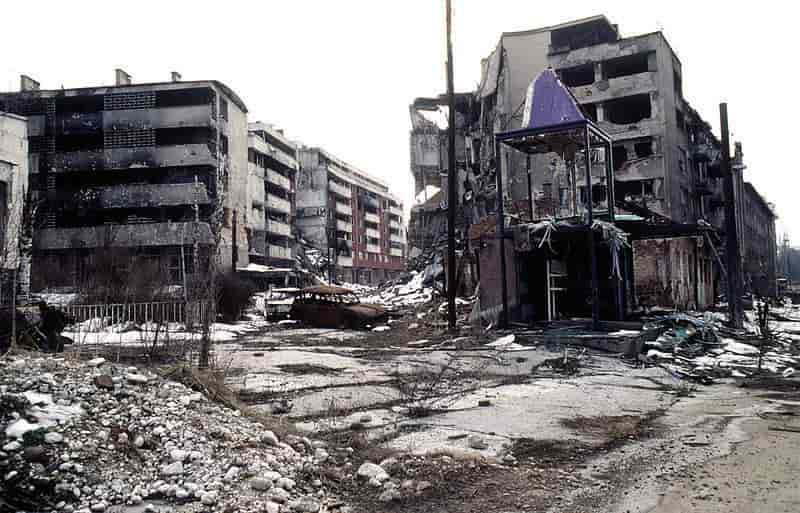Civil wars and the persistence of memory
Can those who fight in a civil war ever truly move past the trauma?
This thought occurred to me last night, as I considered America's own one hundred fifty year old civil war. The armies may have laid down their guns on 9 April, 1865; but the war never ended.
The picture above is of Sarajevo in Bosnia-Herzegovina during the long Yugoslav wars of the 1990s. NATO rolled in eventually, under United Nations auspices, and imposed a sort of desultory peace. But it wasn't peace; it was merely, like in 1865, the cessation of the shooting. The Dayton Accords created a monster of a state, split between revanchist Serbs on one side, and a Croat-Bosniak federation in which the two component peoples don't trust each other, and, in fact, Croats are actively undermining the Frankenstein edifice. The war never ended; it was merely paused.
What would it take for the survivors of civil war to reconcile and rebuild together? In Rwanda, an ethnic Hutu dictatorship was replaced by an ethnic Tutsi dictatorship, which has kept a tight lid on the majority Hutus. But one can't call that reconciliation. Much like Yugoslavia during the Cold War, it merely suppresses hatreds and rivalries. It doesn't resolve them.
In the United States, the answer seemed to be to end Reconstruction, throw the newly-freed Black slaves to the tender mercies of bitter white Southerners, and to rally the country around whiteness as a unifying force. As we see now, those were all grievous mistakes. But was there any other solution? Was the South to be occupied by Union troops indefinitely, the former Confederate states kept in a subjugated limbo, not being readmitted to the Union? White racism in the North was as endemic as it was in the South; Reconstruction would have ended eventually with the same results, with white Northerners no longer being willing to rotate in and out of Alabama to keep down people with whom they had more kinship. The slaves were no longer slaves; but they were far from free, and that was a price that the victors were willing to pay in order to restart the American project. There was no equivalent to denazification after the Second World War in the South—and, of course, denazification itself was eventually quietly put away as Nazis gave way to Communism as the existential threat to the United States and the West. The Confederacy was defeated in the field; but it wasn't defeated in the mind, which led to the mythology of the Lost Cause, to Jim Crow, and to an even greater adherence to white supremacy.
That great poet of the South, William Faulkner, famously said about the past: The past is never dead. It's not even past. The idea that with the fall of the Soviet Union history was at an end and liberal, capitalist democracy would be the dominant ideology, the acme of human development, was a cruel joke. The past is never dead. The past is never past. Because you can defeat an army, but the idea lives on. The spiritual successors of the Nazis are the official opposition in the German Bundestag. And it's safe to say that right at this moment the Confederacy rules in Washington.
In the greatest novel ever written in English, Ulysses, James Joyce has his alter ego Stephen Dedalus say that history is a "nightmare" from which he is trying to awaken. Joyce knew that to keep wallowing in a history of wrongs and recriminations would doom Ireland and humanity to repeating the same mistakes, the same atrocities. But how do you awaken from history? How do you learn from history, but not be its slave?
This is the problem of the human condition. You hit me, I hit you back, you realiate, I get a weapon, you get a bigger weapon, and on and on it goes. You dwell on the wrongs you've suffered, and revenging those wrongs becomes your raison d'etre, yours and your society's. Nothing can ever be resolved, because the only resolution in your mind is for you to dominate those whom you feel have wronged you. And then that perpetuates the cycle.
The closest example I can think of of a society which tried to learn from the past while not reliving it is Joyce's Irish homeland. Specifically Northern Ireland. It's not perfect. Many Unionists are still unwilling to countenance any idea of a reunification with the Republic. But unlike in Bosnia, the idea of a resumption of the Troubles fills most Northern Irish with revulsion. And in the most recent elections, Sinn Féin, the former political wing of the Irish Republican Army, won the most seats in the Assembly. Its leader is the First Minister. That would have been a fantastical notion in 1969, when the first shots were fired. In the Brexit vote, Northern Ireland voted 55% to Remain. At the time of the vote, the Catholic community was still a minority. That meant that many Protestants also wanted to maintain membership in the European Union. This is a result of both communities resolving to awaken from the nightmare of history. To commemorate the past, but to not live in it.
Northern Ireland is a model for our fractured world. A people decided that it would not engage in an endless cycle of sadness and despair. And yes, that meant that people who deserved to be punished for their actions during the civil war would instead go unpunished. But punishment was less valuable than peace.
That's not what we have in the United States. But there's no reason we can't. However, it requires a willingness to learn from the past, but not be burdened by it. The burden of the past is heavy. The nightmare is vivid. When will we awaken from it?
